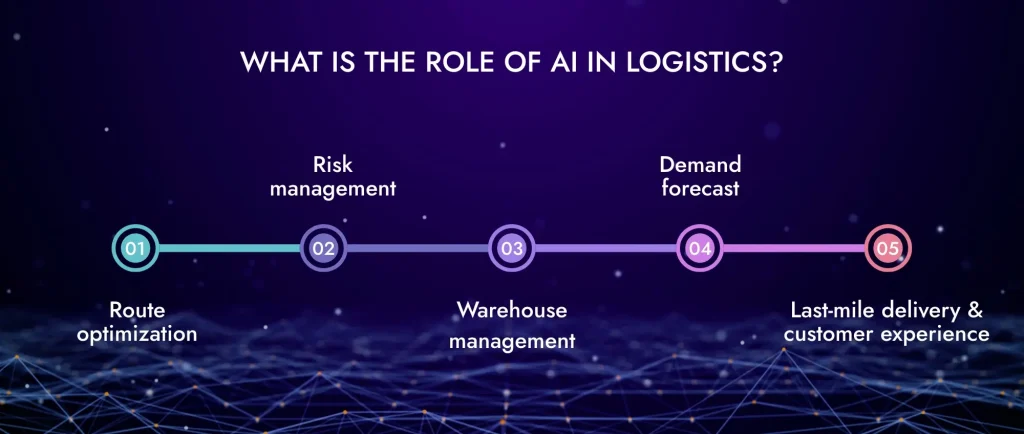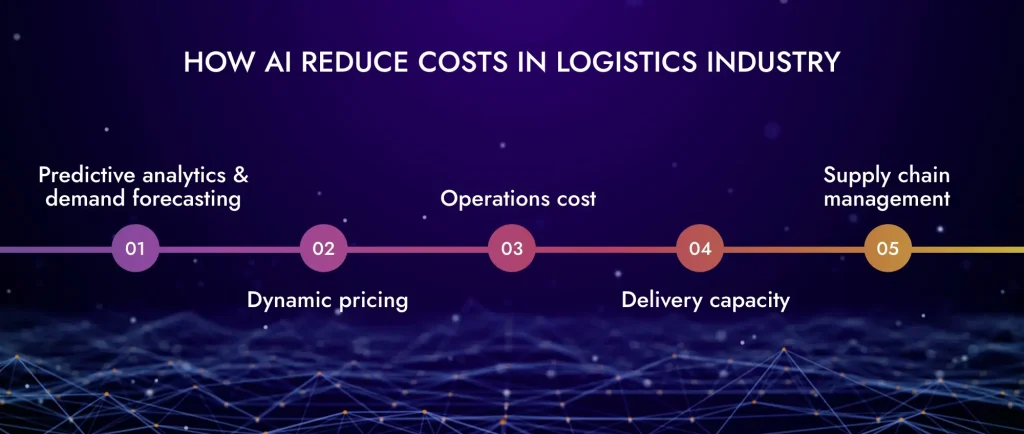Supply chain and logistics are important to the global economy, providing seamless movement of goods across the globe. AI has significantly enriched this sector by analyzing data related to routes, transportation, weather, and more, helping to ensure timely product delivery.
Artificial intelligence has transformed the supply chain and logistics industries by optimizing costs and streamlining operations. AI solutions can automate tasks, optimize routes, reduce expenses, and enhance customer experiences. Moreover, AI empowers businesses to improve their logistics operations, leading to greater efficiency and effectiveness.
Let’s explore how AI is transforming logistics, cutting costs, and boosting operational efficiency. This exploration will highlight why choosing ViitorCloud’s advanced AI services can be a game-changer for your business goals.
What is the role of artificial intelligence in logistics?
AI and machine learning have revolutionized the logistics industry, bringing about in-depth changes. According to Meticulous Market Research, AI in the supply chain market is projected to reach $41.23 billion by 2030. These advancements are reshaping logistics processes, driving down costs, and boosting efficiency. While AI initially focused on automation, machine learning now plays a crucial role in gathering and analyzing data. This data is invaluable for spotting trends and making informed decisions.
Let’s explore more into how AI is transforming logistics.

1. Route optimization
AI power solution uses data to analyze traffic, weather reports, real-time location tracking, and other data to find the best routes. Also, some technology predicts when drivers take a break for food, stop for fuel, and start their route. As a result, time was saved, and the cost was reduced.
2. Risk management
In supply chain management, there is a lot of risk and uncertainty. It can be solved with AI technology. AI tools help analyze historical data and apply statistical modeling to forecast risk factors. The risk factors include weather conditions, warehouse space, freight volume, inventory requirement, and truck driver capacity. Based on these risk factors, forecast companies can plan things in the logistics industry to mitigate the risk.
3. Warehouse management
Managing the volume of loading and unloading in a warehouse takes a lot of work. AI has simplified these processes, such as sorting and labeling the inventory. Also, it speeds up these processes and minimizes the errors in loading and unloading.
4. Demand forecast
AI can collect large amounts of data and analyze historical data, market trends, and external factors to forecast the demand for a product. The demand forecast helps optimize inventory, reduce carrying costs, and improve customer satisfaction. AI algorithms continuously provide information based on real-time data, and your work depends on that forecast.
5. Last-mile delivery and customer experience
Predictive analytics helps identify delivery issues, reduces delays, and improves customer experience. Also, its tracking systems provide customers with accurate updates on their orders, enhancing communication and building customer trust.
Read: Powerful AI use cases in logistics industries
Optimize your logistics with AI
Boost efficiency and reduce expenses with tailored AI solutions. Start your journey with ViitorCloud today.
How AI reduce costs in the logistics industry
When used in the logistics industry, AI streamlines the process with automation and analysis, reducing costs.
Let’s understand how AI is useful in the logistics industry in reducing costs.

1. Predictive analytics and demand forecasting
AI helps predict the demand for the product by analyzing historical data, market trends, and external variables. This helps firms optimize inventory levels and reduce overstocking, saving logistics business costs and time. It also predicts unexpected disruptions and market shifts.
2. Dynamic pricing
AI helps in fixing the price with dynamic pricing. It adjusts prices to maximize sales and profits by assessing data such as market trends, competitor pricing, and customer purchase patterns. Additionally, AI-powered dynamic pricing increases the profit margins and satisfies the customers.
3. Operations cost
Route planning is possible with AI, which saves money on penalties while the product is delayed. Also, it saves money on vehicle upkeep, extends lifespan, and minimizes repair costs by reducing travel distances. It is the way AI logistics cost optimization is possible with operation cost.
4. Delivery capacity
AI optimizes the logistics to increase the delivery capacity without investing in more resources. It helps manage the delivery by identifying the efficient routes and maximum vehicle uses. Additionally, the increase in delivery leads to the company’s overall revenue.
5. Supply chain management
AI can streamline the network by offering visibility, boosting demand forecasts, and optimizing inventory levels. Also, AI can estimate demand by analyzing data from various sources. This data helps estimate consumer input, sales patterns, and external factors such as economic conditions or weather.
When a company can analyze demand trends, it can manage inventory levels, reduce the risk of overstocking, and lower carrying costs.
Also Read: 11 AI applications in logistics every entrepreneur should know
Revolutionize your logistics with AI
Transform your logistics with advanced AI technology. Let’s boost your business together.
How AI can improve efficiency in logistics
AI is automating and streamlining the logistics process. With technology such as natural language processing and machine learning, it is possible to access and understand data on a large scale. AI correlates the data to assist businesses in implementing AI for cost-effective supply chain strategies in logistics in the following ways:
In the logistics industry, it is essential to balance the supply and demand of the product. However, it becomes difficult to keep balance because of shifting patterns, complex data, wrong projections, and changing client expectations. AI integration strategy in the supply chain helps to analyze and understand real-time information for inventory management. Also, it monitors products inside and outside of the warehouse to reduce the cost of overstocking products. AI also predicts shipping delays and other supply chain and logistics issues.
AI-powered solutions include automated vehicles like self-driving drones and trucks, which carry the commodity from one place to another, increasing efficiency and reducing costs. Also, AI algorithms help detect traffic, optimize routes, and adapt to changing driving circumstances. This saves fuel and drive safety and boosts overall operation efficiency. Furthermore, It eliminates the need for driver rest and increases the operation’s productivity in logistics.
AI solutions can predict maintenance by proactively using real-time data and machine learning to identify problems before problems arise. The problems include the breakdown of machines and equipment in the operations. Also, the continuous monitoring of equipment performance helps discover trends and abnormalities in the equipment that break down the equipment. AI monitoring allows the logistics industry to maintain equipment, decrease downtime, and improve efficiency.
Also See: What are the benefits of AI in logistics startups?
Transform logistics with intelligent AI solutions
Authorize your logistics business with AI-driven insights and automation. Contact ViitorCloud for a consultation.
How does ViitorCloud help logistics with AI solutions?
AI transforms the logistics industry by automating processes, analyzing and managing inventory, and optimizing operations. It minimizes downtime, enhances driver safety, increases inventory management accuracy, and streamlines warehouse and supply chain planning. This not only boosts efficiency and productivity but also significantly improves logistics performance.
At ViitorCloud, our AI development service is designed to revolutionize your logistics operations. We specialize in automating manual tasks in warehouses and manufacturing, making your supply chain efficient, profitable, and agile. By implementing AI technology, we help you optimize logistics costs and enhance overall operational effectiveness. Partner with us, and let our expert team take your logistics operations to new heights with our advanced AI solutions.
Frequently asked questions
AI-driven cost reduction in logistics is possible by optimizing delivery routes, predicting maintenance needs to minimize downtime, and decreasing overstocking of the product. AI can analyze the data, so this prediction is possible.
AI optimizes logistics industries by identifying barriers in the supply chain, automating repetitive tasks, and optimizing inventory levels and delivery routes. When repetitive tasks are automated, it saves a lot of time for businesses, and they can focus on important business tasks in the logistics industry.
AI analyses and interprets the data in real-time to monitor goods inside and outside the warehouse. Also, proper inventory management helps reduce risk. Additionally, AI improves the quality standard.

Vishal Patel
Vishal Patel is an experienced Solution Consultant with a proven track record in the information technology and services industry.
